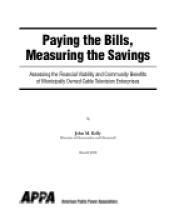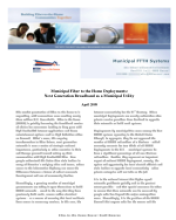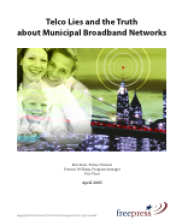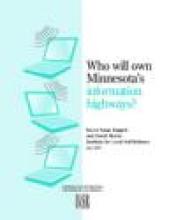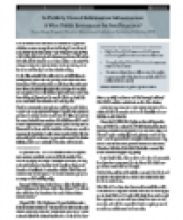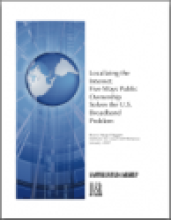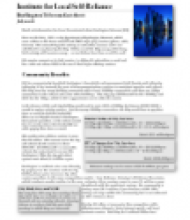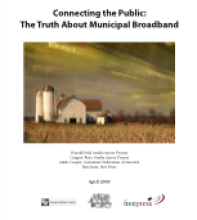Fast, affordable Internet access for all.
Reports
Empirical Study: Does Municipal Supply of Communications Crowd-Out Private Communications Investment?
Paying the Bills, Measuring the Savings
Full Title: Paying the Bills, Measuring the Savings: Assessing the Financial Viability and Community Benefits of Municipally Owned Cable Television Enterprises. This paper provides evidence that municipally owned and operated cable television enterprises are financially viable and provide large rate savings to their communities. The findings contradict allegations in Costs, Benefits, and Long-Term Sustainability of Municipal Cable Television Overbuilds, a 1998 paper authored by Ronald J. Rizzuto and Michael O. Wirth, that such enterprises are likely to be poor investments for cities.
Bringing Fiber to the User: Market Opportunity and Case Studies
Municipal Fiber to the Home Deployments: Next Generation Broadband as a Municipal Utility
Deployments by municipalities were among the first FTTH systems operating in the United States. Though, in aggregate, they do not approach the number of FTTH subscribers of a Verizon – which currently accounts for two-thirds of all FTTH deployments in the U.S. – municipal systems do have a significant percentage of all non-Verizon subscribers. Further, they represent an important aspect of national FTTH deployment, namely, the option and opportunity for local elected officials and civic leaders to upgrade local connectivity - when private enterprise will not take on the job.
Telco Lies and the Truth about Municipal Broadband Networks
The telecom and cable kings of the broadband industry have failed to bridge the digital divide and opted to serve the most lucrative markets at the expense of universal, affordable access. As a result, local governments and community groups across the country have started building their own broadband networks, sometimes in a purely public service and more often through public-private partnerships. The incumbents have responded with an aggressive lobbying and misinformation campaign. Advocates of cable and DSL providers have been activated in several state capitols to push new laws prohibiting or severely restricting municipalities from serving their communities. Earlier this year, Verizon circulated a “fact sheet” to lawmakers, journalists and opinion leaders proclaiming the so-called “failures” of public broadband. Many of the statistics come from a widely discredited study of municipal cable TV networks published in 1998. This paper debunks these lies case by case, juxtaposing information direct from the city networks with quotations from the telco propaganda. The results are unequivocal and damning.
Build Versus Rent: Tropos Wireless White Paper
Who Will Own Minnesota's Information Highways?
Is Publicly Owned Information Infrastructure A Wise Public Investment for San Francisco?
Localizing the Internet: Five Ways Public Ownership Solves the U.S. Broadband Problem
Burlington Telecom Fact Sheet
Much misinformation has been disseminated about Burlington Telecom (BT). Here are the facts. BT is a city department of Burlington, Vermont, which owns a fiber-to-the-home network and offers triple play services (phone, cable, internet). The network depends entirely on subscriber revenues and is not subsidized in any form by the City. BT has saved the City money while being built entirely with investor money -- no tax dollars have been or will be used.
ILSR issued a report in 2011 that updates this case study: Learning from Burlington Telecom: Some Lessons for Community Networks


